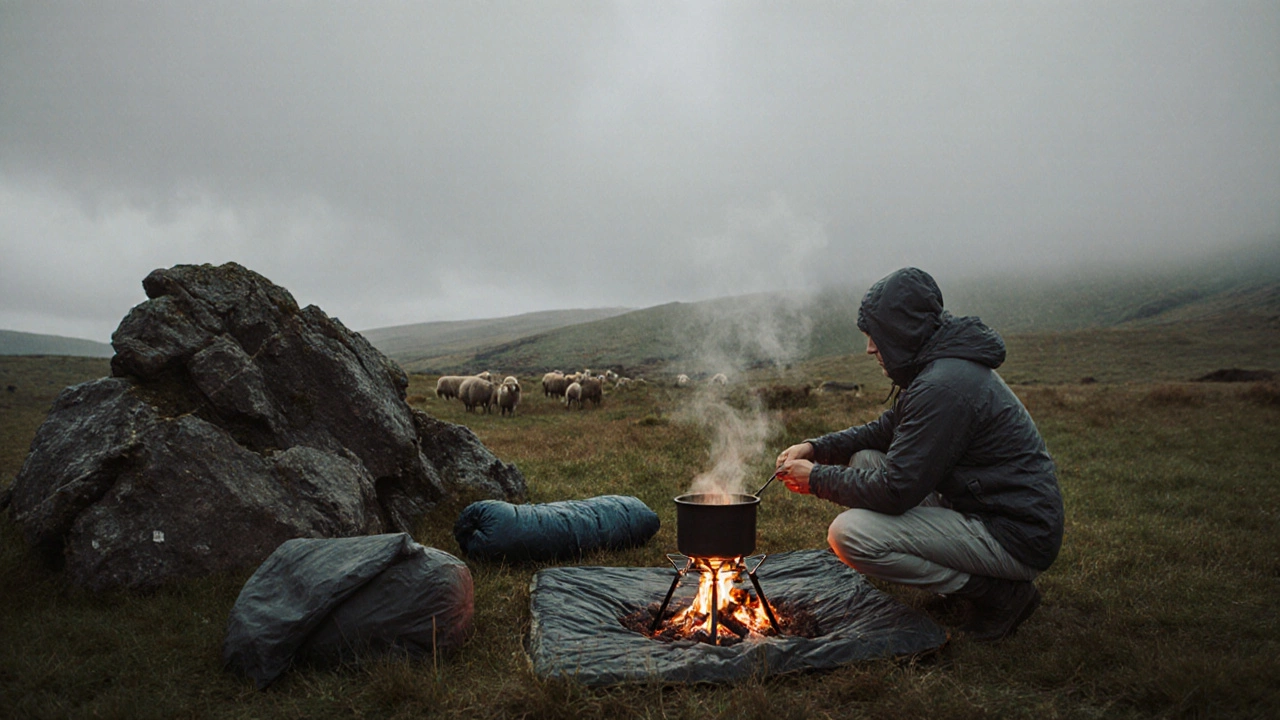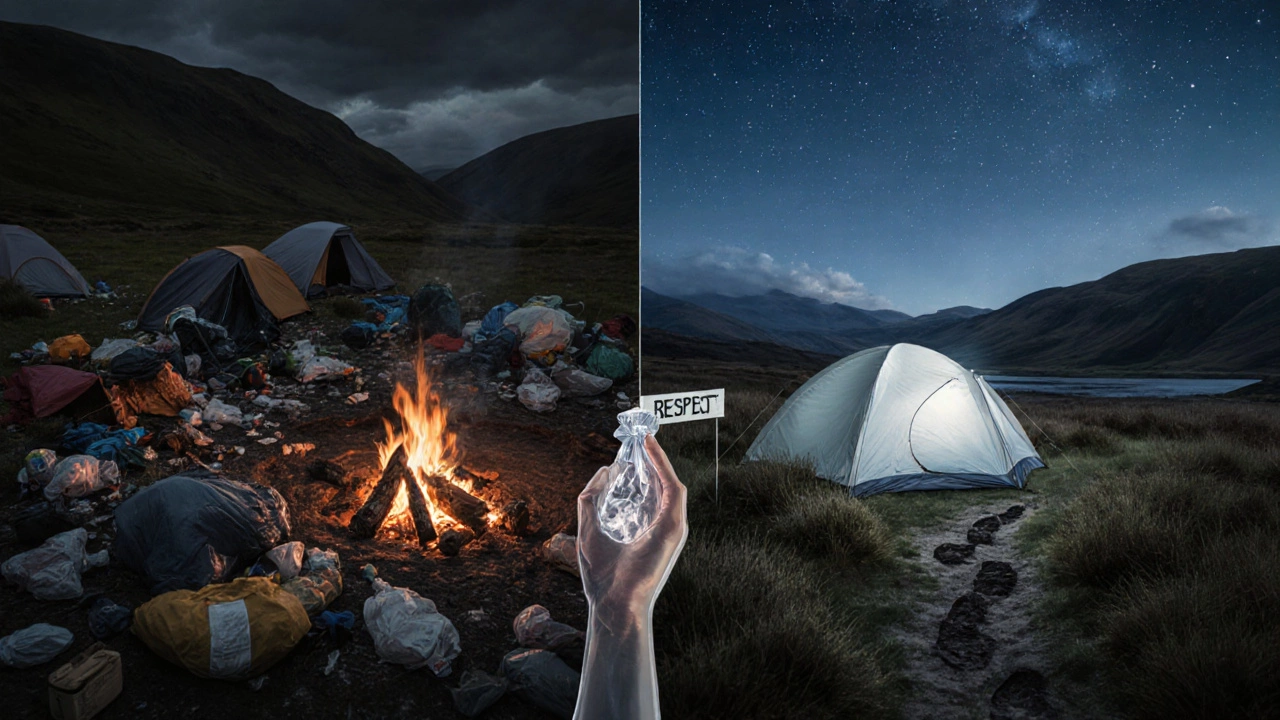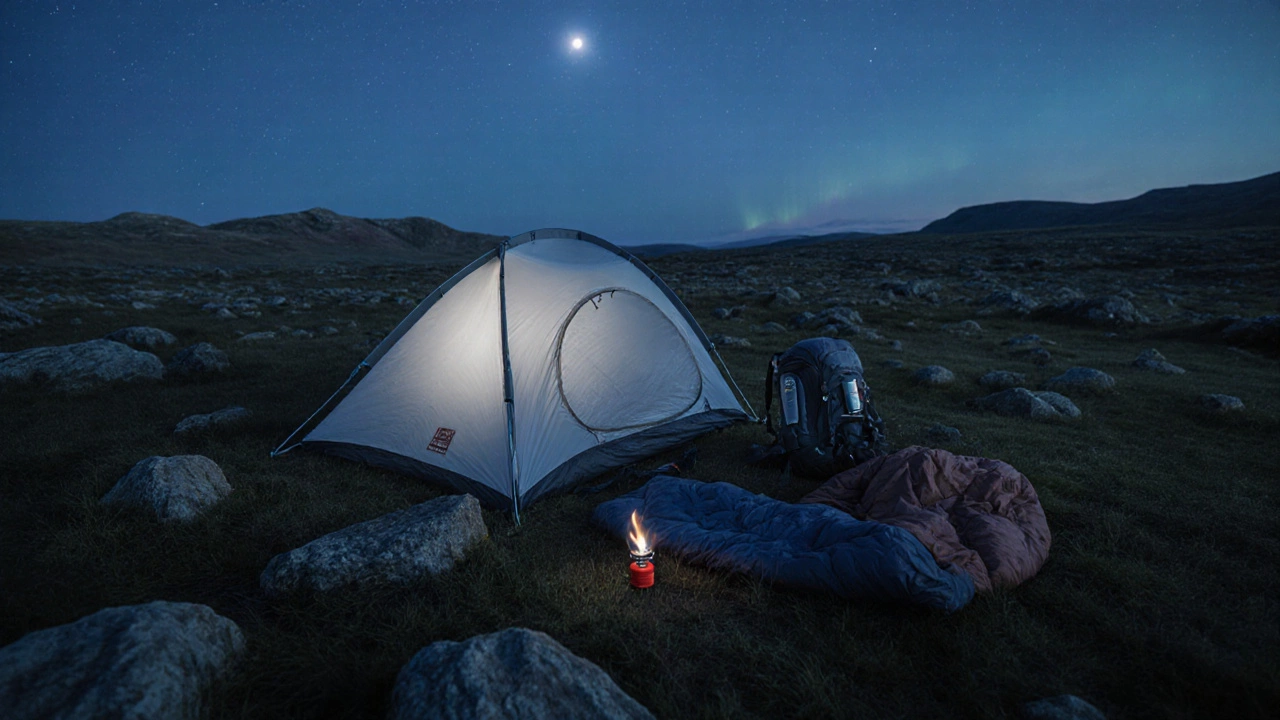Wild camping in the UK isn’t illegal everywhere-but that doesn’t mean it’s safe, easy, or welcome everywhere either. If you’re thinking about pitching a tent under the stars in the Scottish Highlands, the Lake District, or even a quiet corner of Wales, you need to know the real risks, the legal gray areas, and how to avoid getting fined, harassed, or worse. This isn’t about romanticizing solitude. It’s about staying safe, staying legal, and respecting the land and the people who live there.
Where wild camping is actually allowed in the UK
The UK isn’t one country when it comes to wild camping laws. Scotland is the only part of the UK where it’s clearly legal under the Scottish Outdoor Access Code. As long as you follow the rules-camping small groups, staying no more than two or three nights in one spot, leaving no trace, avoiding private land and farmland-you’re fine. Thousands do it every year without issue. The Highlands, Cairngorms, and Isle of Skye are packed with campers who know how to behave.
England and Wales are a different story. Wild camping is technically illegal without the landowner’s permission. That doesn’t mean no one does it. In remote areas like the Brecon Beacons, Dartmoor, or the Lake District, you’ll find tents tucked away in valleys and behind hills. But here’s the catch: landowners can-and do-call the police. You might get a warning. You might get a fine. Or you might just be asked to leave, sometimes with no notice.
Dartmoor is the only exception in England. Since 2023, the Dartmoor National Park Authority has allowed wild camping in most of the national park, as long as you follow strict rules: no fires, no camping within 100 meters of roads or buildings, no more than two nights in one spot, and no groups larger than six. This is the closest thing to legal wild camping in England-and it’s the only place where you won’t risk a fine if you follow the rules.
The biggest dangers aren’t what you think
Most people worry about bears, thieves, or getting lost. That’s not the real threat. The biggest dangers are weather, isolation, and poor preparation.
UK weather changes fast. A sunny morning in the Cairngorms can turn into a blizzard by afternoon. In 2024, three hikers died in the Lake District after being caught in sudden snowfall while wild camping. They weren’t equipped for winter conditions. They didn’t check the forecast. They didn’t tell anyone where they were going.
Isolation is another silent killer. If you twist an ankle miles from the nearest road, there’s no one to hear you scream. Mobile signal is patchy-even in popular areas. A satellite messenger like a Garmin inReach or a SPOT device isn’t a luxury. It’s a lifeline. Many experienced wild campers carry one, even on short trips.
And then there’s hypothermia. It doesn’t take freezing temperatures. Damp clothes, wind, and a night without proper insulation can drop your core temperature dangerously low. A good sleeping bag rated for 0°C or lower, a thermal mat, and a waterproof bivvy bag can mean the difference between a quiet night and a hospital trip.
How to avoid getting into trouble
If you want to wild camp without being chased off, fined, or reported, follow these non-negotiable rules:
- **Never camp on farmland.** Livestock, crops, and fences aren’t there for your convenience. A farmer can legally demand you leave-and will.
- **Avoid visible locations.** Don’t pitch right beside a trail, a road, or a house. Out of sight doesn’t mean out of bounds-but it means less chance of being noticed.
- **Leave no trace.** Pack out every scrap of trash. Even biodegradable food waste attracts animals and ruins the environment. Use a small trowel to bury human waste at least 60 meters from water sources.
- **No fires.** Open fires are banned in most wild areas. They damage peat, risk wildfires, and leave scars. Use a camping stove. They’re lighter, safer, and legal everywhere.
- **Be quiet and leave early.** Arrive after dark, leave before sunrise. You’re a guest, not a resident.
There’s a reason the Leave No Trace principles exist. They’re not just nice ideas-they’re survival tactics for wild camping in the UK. If you break them, you’re not just risking your own safety. You’re making it harder for everyone else to do this legally in the future.

What happens if you get caught?
Most landowners don’t want to call the police. They just want you gone. If someone approaches you and asks you to leave, don’t argue. Pack up and go. Resist, and you risk being charged with trespassing. In England and Wales, trespass is a civil offense, not a criminal one-but police can still intervene if they think you’re causing a disturbance.
In Scotland, you’re protected by law as long as you follow the code. But even there, landowners can ask you to move if you’re camping too close to their home or livestock. Respect that. It’s not about power-it’s about coexistence.
There are rare cases where people have been fined. In 2023, a group in the Lake District was issued £500 fines after camping near a popular hiking trail and leaving behind 15kg of trash. The fine came from the local council, not the landowner. That’s the kind of mistake that makes wild camping harder for everyone.
When to skip wild camping entirely
Some situations aren’t worth the risk:
- You’re with kids under 10. Emergency response times in remote areas can be over two hours. You need to be prepared for anything-and most families aren’t.
- You’re new to camping. If you’ve never slept outside without facilities, start with a designated campsite. Learn how to set up a tent in rain, how to read a map, how to handle a gas stove before you’re alone in the hills.
- The weather forecast is iffy. If rain, wind, or cold is predicted, don’t risk it. There are plenty of cheap, clean campsites with showers and toilets. Use them.
- You’re in a national park without clear rules. The Peak District, Snowdonia, and the Yorkshire Dales don’t allow wild camping. Even if you don’t see anyone, you’re breaking the law.

Alternatives to wild camping that are just as good
You don’t have to sleep under the stars to feel like you’re truly away from it all. Many small, independent campsites offer privacy, quiet, and real value:
- Low-impact sites: Places like Wild Camp in the Lake District or Wild Camping Wales offer legal, off-grid spots with no electricity, no hookups, and no crowds. You pay £10-15 a night and get a quiet field, a compost toilet, and a water tap.
- Farm stays: Some farmers rent out fields for camping. You get a bit more comfort, and you’re supporting local people.
- Motorhome parking: Many service stations and pubs in rural areas allow overnight motorhome parking for free. You can sleep in your van, use the toilet, and still be off the beaten path.
These options are safer, legal, and often more peaceful than trying to sneak into a remote valley. And you’ll sleep better knowing you didn’t break any rules.
Final thought: It’s not about permission-it’s about respect
Wild camping in the UK isn’t a right. It’s a privilege. And like any privilege, it comes with responsibility. The people who’ve made it possible are the ones who’ve shown up quietly, left nothing behind, and treated the land like it’s their own.
If you’re willing to do the same, you’ll find that the UK’s wild places are still open to you. But if you cut corners, make noise, or leave trash, you’re not just risking a fine. You’re closing the door for everyone else.
So before you head out, ask yourself: Am I here to enjoy the land-or to take from it?
Is wild camping legal in England?
Wild camping is not legal in England except in Dartmoor National Park, where it’s allowed under strict rules. Everywhere else, you need the landowner’s permission. Even if no one sees you, you’re still breaking the law. Getting caught can lead to being asked to leave, fines, or even police involvement.
Can you wild camp in Scotland without permission?
Yes, as long as you follow the Scottish Outdoor Access Code. You don’t need permission from landowners, but you must camp responsibly: small groups, no more than 2-3 nights in one spot, no fires, no damage to land or livestock, and always leave no trace. This is a legal right, not a loophole.
What’s the safest way to wild camp in the UK?
The safest way is to camp in Dartmoor (England) or follow the Scottish Outdoor Access Code (Scotland). Always carry a satellite messenger, a good sleeping system, and a stove. Never camp near roads, farms, or houses. Arrive after dark, leave before dawn, and pack out every piece of trash. Preparation is your best protection.
Are fires allowed when wild camping in the UK?
No. Open fires are banned in almost all wild camping areas. They damage peat soils, risk wildfires, and leave lasting scars. Even in Scotland, where wild camping is legal, fires are strongly discouraged. Use a camping stove instead. They’re safer, lighter, and legal everywhere.
What should I do if someone asks me to leave while wild camping?
Pack up and leave immediately. Don’t argue, don’t get defensive. Even if you think you’re not doing anything wrong, the landowner has the right to ask you to go. Resisting can lead to police involvement, fines, or being banned from the area. It’s not worth the risk.
